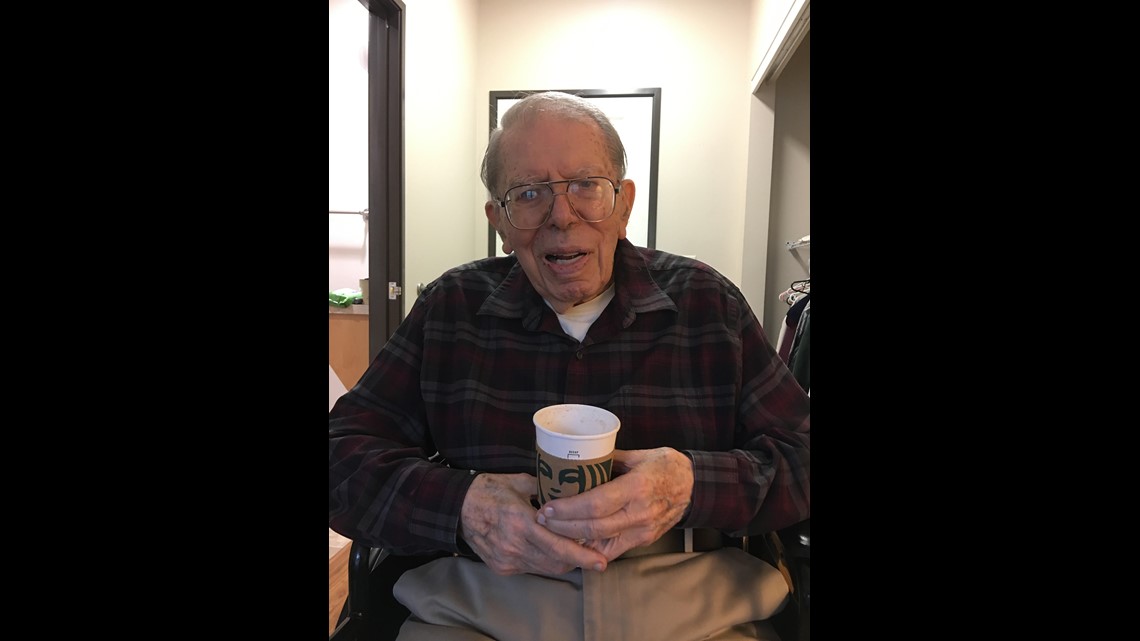PORTLAND, Ore. — There is a growing concern among families with loved ones in adult care communities that isolation is doing more harm than good.
Sally Davies of Dallas, Oregon says her dad has had Alzheimer's for about 15 years. He moved into a Salem memory care facility two years ago.
"The person he was 3 months ago, is not the person he is now," Davies said.
Edward Straka is a retired dentist, Davies says he's a kind person with a giant heart.
"Very community-oriented. Loves people. Loves helping people. Doing things. Very active," she said, "I describe him as a gentleman and a gentle man."
On Valentine's day of 2020, the memory care community he lives in held a dance for residents and their families.
"He stood up and danced with me, we were talking and laughing and loving and hugging and it was awesome."
The COVID-19 pandemic hit shortly thereafter and to protect residents in adult care communities around the state, Governor Kate Brown restricted access to visitors like Davies.
"Families didn't get a chance to come in and say goodbye or see their loved ones one last time before this happened and that makes it so much worse because no one got a chance to prepare for this," said Samantha Demchak who works at the same community Straka lives at.
"It's very difficult to try and have the residents understand why their loved ones can't come," Demchak says.
In three and a half months of isolation, Davies has seen a big change in her dad's well-being.
"He's confined to a wheelchair, now he can hardly get a conversation out. Some days are better than other days," Davies said her dad has lost a lot of weight and babbles more than talks during conversations held over video chats.
Demchak says the community that she works at did do window visits and visits in the courtyard, but that physical touch is what those with Alzheimer's and dementia need most.


"People with Alzheimer's, they like touch, they like hugs. They like to feel the physical. When you can't do that and when you love somebody and when you can't do that it's excruciating," Davies said.
Davies wrote Governor Kate Brown asking for solutions that will help residents like her dad keep from regressing.
In the letter she writes, "I propose outside visits with PPE in place, including a partition between the resident and family member. Personal touch is huge for those with Alzheimer’s. Even so, seeing a family member in person and without touch is better than the current situation – no contact and isolation. In my situation, if my Dad doesn’t receive “face-to-face” contact with me, he will continue to decline and probably won’t be alive in September when care homes are opened again."
It goes on to say, "He doesn't deserve to die this way. I hope you will consider options to allow those in memory care homes the personal contact they need to survive."
Ann McQueen is the research and policy integration manager for the Aging and Peoples with Disabilities Office within the Department of Human Services. She says the state is looking at all options to try and get to what visitors had before COVID hit.
"It's very hard to come up with something that's the same as a hug or that physical touch."
McQueen says the risk to the greater community needs to be taken into effect.
"By allowing that kind of touch to happen at this point in time, we would be risking the lives of other residents and other people in the community. Which is especially scary to us given that Oregon's numbers have been spiking."
Davies understands that and no one wants to bring COVID into a high-risk population, she just hopes something happens so others don't have to see their loved one's health decline as quickly as she says her dad's has.
"It's not going to help my dad, but maybe it will help somebody else from declining like this."
KGW requested to speak with Governor Kate Brown regarding the letter Davies sent and the concern from other families. Charles Boyle, Deputy Communications Director for Governor Brown said she wasn't available but sent along this message:
"These are heartbreaking decisions, and we know how incredibly difficult this pandemic has been for the residents of long-term care facilities and their loved ones. Governor Brown took decisive action at the outset of this outbreak to protect the residents of these facilities, who are especially at risk for serious illness and death from COVID-19. But we know these strict visitation policies come with a cost. Last month, Governor Brown announced a comprehensive plan to test long-term care facility residents and staff for COVID-19–– around 60,000 people in total. It’s our hope that this testing, coupled with ongoing infection control measures, will provide a pathway toward easing visitation restrictions for some long-term care facilities. In the meantime, we thank these families for their patience and their understanding, and for the sacrifices they have made to help protect their loved ones and everyone in Oregon’s long-term care facilities from additional COVID-19 outbreaks."

